Keeping Foods Fresh in Your Refrigerator for a Longer Period
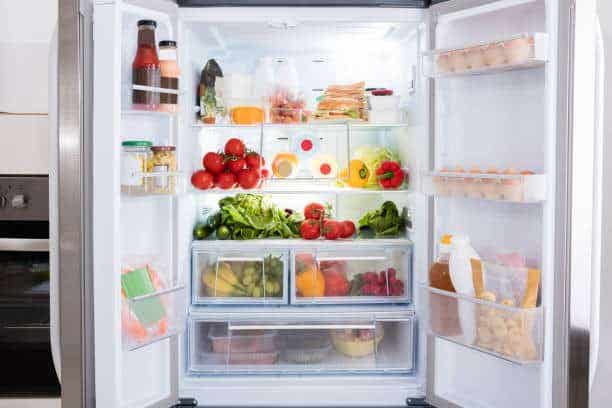

Keeping Foods Fresh in Your Refrigerator for a Longer Period
If your lifestyle makes you store food for the whole week, you want to have a fridge that will give you crunchy salad leaves at the end of the week. But in reality, it is always not the fridge that keeps food fresh for a more extended period. There are many more matters present here. There are some easy rules to maintain the stored food with the refrigerator you have in your kitchen. There is a guideline for freezers as well. We need to consider some primary conditions about storing food in the proper manner in any refrigerator to make our life easy and get fresh food for a longer period.
Essential Conditions for Getting Fresh Foods for a Longer Period
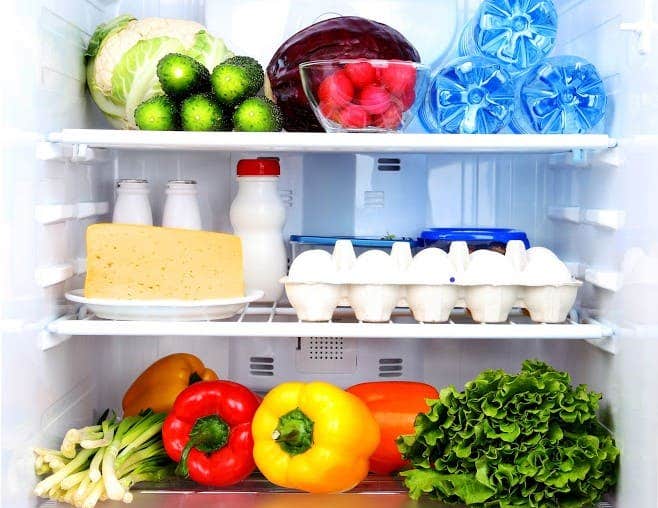

We store different types of food in the refrigerator to meet our food diet. We use different compartments for storing meat, eggs, milk, and vegetables as a refrigerator has separate sections to store various types of food. We can not put the meat in the general food compartment because we must keep it in the freezer. Also, we have to avoid moldy or recalled food in the refrigerator as it can quickly grow bacteria on the other food. Top Mount Refrigerator or French Door Refrigerator, is has some specific compartments to store food in a certain manner. If we know such simple basic rules and follow them correctly, we can enjoy fresh food for a longer period.
- Store Fresh Food: This is the very first condition for getting fresh food from the refrigerator. If the food itself is not new, it will not give you your optimum expectation a few days later.
- Treat Food Depending on its Type: You have to keep your food depending on its type. Fruits and vegetables need to be kept a certain way; eggs, milk, and dairy products need to be held another way. Also, keep meats in the freezer as they need the cooler temperature to stay fresh.
- Separate Food based on Cooked, Half-Cooked, Fully Cooked: It is good to keep fully cooked food particularly; half-cooked food does not require that. Again, raw food has different ways to save. If you can maintain this thing, you are good to go.
- Treat Food with Strong Odor Especially: You have to keep that food with a strong flavor, fragrance, and odor. You cannot store onion openly in a bowl, spreading its pungent smell. The same goes for a cooked curry with a strong odor. Again, you need to know the proper method and use appropriate tools to keep them separately and adequately.
- Throw Out Moldy Food: You need to throw moldy food to keep the refrigerator fresh and get fresh food. Having stale food in the refrigerator hampers other food as well. It affects other foods to grow bacteria as well.
- Use Appropriate Tools Accessories: When food is sealed, whether in zip-top plastic bags or reusable silicone pouches, it keeps fresh for longer.
- Use Compartments Properly: In a typical refrigerator, the temperature is controlled by several compartments. The main compartment holds most of the food, and there are several shelves. If the fridge has a dedicated drawer for these items, it's best to keep them there because these drawers help to keep the temperature consistent. The top shelves are ideal for storing leftovers, prepared meals, and beverages.
- Avoid Overloading Refrigerators: This is one of the most common wrong tendencies. If you overload your refrigerator, it will not work efficiently. It prevents proper airflow and fails to maintain the appropriate temperature. Also, it will fail to cool evenly. Ultimately, you will get moldy food.
- Clean Your Refrigerator: Last but not least, you need to clean your refrigerator as per schedule. A filthy refrigerator cannot provide you with fresh food. Make your refrigerator clean for odor-free fresh food.
Rules and Tips to get Fresh Food after a Long Time
- Guidelines for Keeping Eggs: Eggs can be refrigerated for three to five weeks after being placed in the refrigerator. To keep eggs safe, bring them home and immediately put them in a refrigerator set at 40 °F or slightly below. Place them in their carton in the coldest part of the refrigerator, not in the door. After hard cooking, eggs can be kept in the refrigerator for up to a week.
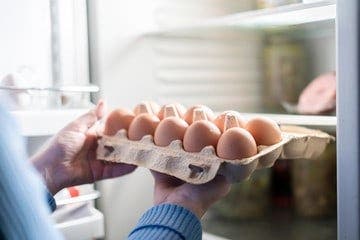

- Guidelines for Dairy Products: Refrigerate milk, cottage cheese, and other dairy products tightly sealed. Seal the food once more with plastic wrap or an airtight container. Hard cheese should be stored in its original store packaging until used. Don't worry about wrapping the cheese too tightly because it needs to breathe.
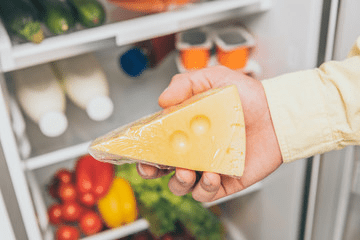

- Guidelines for Fruits and Vegetables: When storing fruits and vegetables together, keep similar foods in separate drawers. Don't mix apples and carrots or oranges and spinach; instead, keep each type of vegetable in its drawer. Use breathable bags or place vegetables in un-sealed bags to ensure an optimal lifespan. Avoid the temptation to wash produce before storing it because moisture kills vegetables. Some fruits are better purchased frozen if they are not in season. When possible, freeze bananas, and avoid breaking the stem when pulling one-off to keep the bananas fresher for longer.
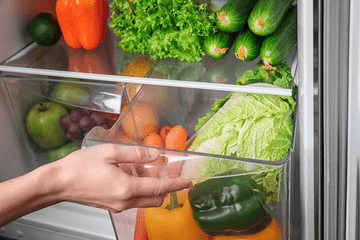

- Guidelines for Meat and Fish: Raw meat, fish, and poultry pose some of the most significant health risks in the refrigerator. Place these items in sealable containers or on a plate to prevent any juices from escaping. If the meat is not used within a few days, it should be placed in a freezer bag with as much air removed as possible. Raw ground meats, poultry, seafood, and other meats can be kept in the refrigerator for up to two days. Raw roasts, steaks, and chops can be stored in the refrigerator for up to five days. Cooked meat, poultry, and seafood can be stored for our days. The use of a vacuum-sealed bag does not extend the life of the meat in the refrigerator.
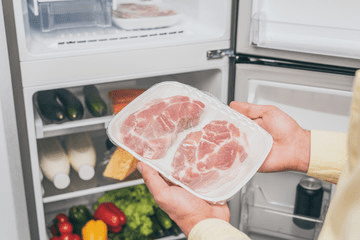

- Guidelines for Bread and Butter: Loaves of bread do not need to be refrigerated, but a lower temperature can help prevent mold growth. This is especially true for those who live in humid climates. The refrigerator's conditions are controlled, and the cooling mechanism helps remove some of the humidity from the air. About butter, It is perfectly acceptable to leave butter on a tray with a lid. However, if the butter is not refrigerated, it may melt. To help preserve the flavor and taste of butter, keep it on one of the refrigerator's outer selves.
- Guidelines for Herbs: Snip off the bottoms of your herbs, preferably on the diagonal, to allow them to absorb more water through the stems. Dab the leaves dry with a dry towel before placing them in a small jar of water. Refrigerate them in an airtight container or bag to keep them fresher for longer.
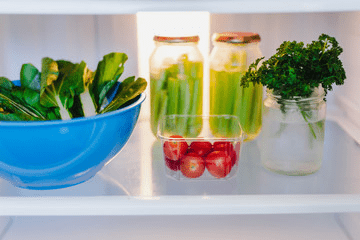

- Guidelines for Leftovers: Keep your leftovers in leak-proof containers or wraps to keep them as fresh as possible. Always eat the oldest foods first, and don't refrigerate leftover soup broth, tuna fish, cranberry sauce in cans. Don't open cans with metal on the rim, leaching into the food and leaving a metallic taste. If you're using frozen leftovers, check the temperature of your fridge at 40°F or below.
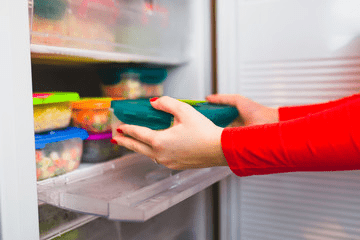

- Guidelines for Cookies: The goal of storing homemade cookies and cookie dough for later use is to keep them fresh. The key to preserving cookies is to limit their exposure to air. If you plan to eat baked cookies more than four days after they've been baked, place them in the freezer.
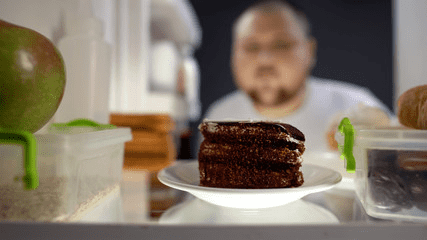

Conclusion
We're all guilty of food waste, but there are ways to get fresh, healthy ingredients while saving money. Try to Make a list of what you want to eat and then a simple shopping list to give you a focus and a purpose for the foods you're buying. Following the basic guidelines will help you achieve your goal of enjoying fresh food for more extended posts properly storing food.


Already Have An Account
Sign In To Track Your Order, Use Wishlist & More.